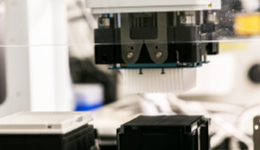-
University Guide
 University Guide
University Guide
INDEX- Introducing the President
- University Introduction
- University Evaluation
-
Policies and Initiatives
- Policy and Initiatives INDEX
- Compliance
- Crisis Management System
- Promoting gender equality
- International Exchange Policy
- Infrastructure longevity plan (individual construction plan)
- Environmental Initiatives
- Smoking is prohibited throughout the university grounds.
- Safety Management Action Plan
- JABEE Initiatives
- Basic rules regarding drinking among Muroran Institute of Technology students
- Policy for promoting the sharing of research facilities and equipment at Muroran Institute of Technology
- Campus Master Plan
- Muroran Institute of Technology Conflict of Interest Management Policy
- Digital Campus Promotion
- Muroran Institute of Technology Open Access Policy
- Muroran Institute of Technology Research Data Policy
-
Information Disclosure
- Information Disclosure INDEX
- Disclosure of corporate information (information about the organization)
- Disclosure of corporate information (information regarding business)
- Disclosure of corporate information (financial information)
- Publication of corporate information (evaluation information)
- Disclosure of corporate information (audit information)
- Publication of educational information
- Compliance status with the National University Corporation Governance Code
- Rules
- Information Disclosure System
- Personal Information Protection System
- Publication of guidelines for employees regarding the promotion of the elimination of discrimination against people with disabilities
- Announcement of the New Support System for Higher Education
- Application and recruitment information
- public relations
-
Faculty/Graduate School/Center etc.
 Faculty/Graduate School/Center etc.
Faculty/Graduate School/Center etc.
INDEX- Faculty of Science and Engineering
- graduate school
-
Affiliated facilities (centers, etc.)
- Affiliated Facilities (Centers, etc.) INDEX
- Creative Collaboration Center
- Aerospace Plane Research Center
- Rare Earth Materials Research Center
- Computer Science Center
- Research Infrastructure Equipment Sharing Center
- Technology Department
- Career Support Center
- International Exchange Center
- Information Education Center
- Affiliated Library
- Health Management Center
- Gender Equality Promotion Office
- MONO Creation Future Co-Creation Organization
- Regional Collaboration Human Resources Development Center
- Manufacturing Infrastructure Center
- Robot Arena
- satellite
- Tokyo Office
- the study
-
Student Life/Employment
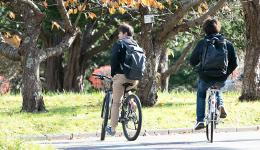 Student Life/Employment
Student Life/Employment
INDEX-
Courses and classes
- Course/Class INDEX
- Academic Calendar
- Lesson plan (syllabus)
- Classes (timetable)
- Exam (timetable)
- Course Affiliation
- Credit transfer with other universities
- Re-reading of course subjects
- CAMPUS SQUARE (Course registration)
- How to take the course
- Student Handbook/Graduate School Course Guidelines
- Transfer of departments, etc.
- Doctoral Degree Application Guide
- Academic Counseling and Guidance
- Duration of study
- Long-term student system
- Educational Programs (not required for graduation or completion)
- A Note About Generative AI
-
Student Life
- Student Life INDEX
- Suspension and Absence
- Various notification and certificate issuance procedures
- Student ID and student number
- Student discount card/school attendance certificate
- Procedures for taking a leave of absence, reinstating, and withdrawing from school
- New academic year orientation
- Preserving the on-site environment
- Attention students
- Transportation on and off campus
- Message board/contact method
- Harassment
- health care
- Events
- Welfare facilities
- Student Dormitory
- Student Support Center Introduction
- Student General Advice Office
- Extracurricular Activities
- Tuition, scholarships and other procedures
- Employment and qualification support
-
Courses and classes
-
Entrance Examination Information
 Entrance Examination Information
Entrance Examination Information
INDEX- University Entrance Examination [Faculty]
- Graduate School Entrance Examination
- Transfer Admissions
- Entrance examination for international students
- Specialized students and research students
- Admission procedures, tuition fees, etc.
- FAQ
- University Introduction
- Request information

-
Social Cooperation
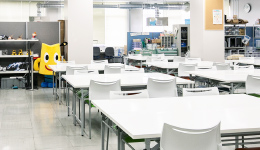 Social Cooperation
Social Cooperation
INDEX- Collaborative News
- Collaboration Centers, etc.
-
Industry-academia-government collaboration
- Industry-academia-government collaboration INDEX
- Alliance Lab
- Research Collaboration Association
- Muro Institute of Technology venture title
- Confidentiality
- Joint Research System
- Commissioned Research System
- Academic Guidance System
- Tangible research results
- Scholarship and Donation System
- Donation field etc.
- Future Creation Promotion Expenses
- Regarding the expenditure of personnel expenses of the principal investigator (PI) from direct costs of competitive research grants
- Research ethics and safety
- Public Lectures
- Muro Institute of Technology Science School
- University Visit
- Robot Soccer Contest
- Re-education for working adults
-
International Exchange
 International Exchange
International Exchange
INDEX- International Academic Exchange Agreements
- Number of international students
- Researcher Database
- Entrance Exam
- Tuition Fees
- International Student Support (for new students)
-
Support for international students (for current students)
- Scholarships for International Students
- Japanese Language Course for International Students
- Immigration procedures (renewal of period of stay, permission to engage in activities other than those permitted under the status of residence, re-entry permission)
- Procedures after arriving in Japan
- Procedures for changing address (under construction)
- Procedures upon returning to Japan
- Notification of absence due to temporary return to Japan, travel, etc.
- Employment for international students
- Emergency Contact Information
- Studying abroad from Muro Institute of Technology
- Request for donations
-
University Guide
University Guide INDEX
- Introducing the President
- University Introduction
- University Evaluation
-
Policies and Initiatives
- Policy and Initiatives INDEX
- Compliance
- Crisis Management System
- Promoting gender equality
- International Exchange Policy
- Infrastructure longevity plan (individual construction plan)
- Environmental Initiatives
- Smoking is prohibited throughout the university grounds.
- Safety Management Action Plan
- JABEE Initiatives
- Basic rules regarding drinking among Muroran Institute of Technology students
- Policy for promoting the sharing of research facilities and equipment at Muroran Institute of Technology
- Campus Master Plan
- Muroran Institute of Technology Conflict of Interest Management Policy
- Digital Campus Promotion
- Muroran Institute of Technology Open Access Policy
- Muroran Institute of Technology Research Data Policy
-
Information Disclosure
- Information Disclosure INDEX
- Disclosure of corporate information (information about the organization)
- Disclosure of corporate information (information regarding business)
- Disclosure of corporate information (financial information)
- Publication of corporate information (evaluation information)
- Disclosure of corporate information (audit information)
- Publication of educational information
- Compliance status with the National University Corporation Governance Code
- Rules
- Information Disclosure System
- Personal Information Protection System
- Publication of guidelines for employees regarding the promotion of the elimination of discrimination against people with disabilities
- Announcement of the New Support System for Higher Education
- Application and recruitment information
- public relations
-
Faculty/Graduate School/Center etc.
Faculty/Graduate School/Center etc. INDEX
- Faculty of Science and Engineering
- graduate school
-
Affiliated facilities (centers, etc.)
- Affiliated Facilities (Centers, etc.) INDEX
- Creative Collaboration Center
- Aerospace Plane Research Center
- Rare Earth Materials Research Center
- Computer Science Center
- Research Infrastructure Equipment Sharing Center
- Technology Department
- Career Support Center
- International Exchange Center
- Information Education Center
- Affiliated Library
- Health Management Center
- Gender Equality Promotion Office
- MONO Creation Future Co-Creation Organization
- Regional Collaboration Human Resources Development Center
- Manufacturing Infrastructure Center
- Robot Arena
- satellite
- Tokyo Office
- the study
-
Student Life/Employment
Student Life/Employment INDEX
-
Courses and classes
- Course/Class INDEX
- Academic Calendar
- Lesson plan (syllabus)
- Classes (timetable)
- Exam (timetable)
- Course Affiliation
- Credit transfer with other universities
- Re-reading of course subjects
- CAMPUS SQUARE (Course registration)
- How to take the course
- Student Handbook/Graduate School Course Guidelines
- Transfer of departments, etc.
- Doctoral Degree Application Guide
- Academic Counseling and Guidance
- Duration of study
- Long-term student system
- Educational Programs (not required for graduation or completion)
- A Note About Generative AI
-
Student Life
- Student Life INDEX
- Suspension and Absence
- Various notification and certificate issuance procedures
- Student ID and student number
- Student discount card/school attendance certificate
- Procedures for taking a leave of absence, reinstating, and withdrawing from school
- New academic year orientation
- Preserving the on-site environment
- Attention students
- Transportation on and off campus
- Message board/contact method
- Harassment
- health care
- Events
- Welfare facilities
- Student Dormitory
- Student Support Center Introduction
- Student General Advice Office
- Extracurricular Activities
- Tuition, scholarships and other procedures
- Employment and qualification support
-
Courses and classes
- Entrance Examination Information
-
Social Cooperation
Social Collaboration INDEX
- Collaborative News
- Collaboration Centers, etc.
-
Industry-academia-government collaboration
- Industry-academia-government collaboration INDEX
- Alliance Lab
- Research Collaboration Association
- Muro Institute of Technology venture title
- Confidentiality
- Joint Research System
- Commissioned Research System
- Academic Guidance System
- Tangible research results
- Scholarship and Donation System
- Donation field etc.
- Future Creation Promotion Expenses
- Regarding the expenditure of personnel expenses of the principal investigator (PI) from direct costs of competitive research grants
- Research ethics and safety
- Public Lectures
- Muro Institute of Technology Science School
- University Visit
- Robot Soccer Contest
- Re-education for working adults
-
International Exchange
International Exchange Index
- International Academic Exchange Agreements
- Number of international students
- Researcher Database
- Entrance Exam
- Tuition Fees
- International Student Support (for new students)
-
Support for international students (for current students)
- Scholarships for International Students
- Japanese Language Course for International Students
- Immigration procedures (renewal of period of stay, permission to engage in activities other than those permitted under the status of residence, re-entry permission)
- Procedures after arriving in Japan
- Procedures for changing address (under construction)
- Procedures upon returning to Japan
- Notification of absence due to temporary return to Japan, travel, etc.
- Employment for international students
- Emergency Contact Information
- Studying abroad from Muro Institute of Technology
- Request for donations
- HOME
- Faculty/Graduate School/Center etc.
- Faculty of Science and Engineering
- Department of Creative Engineering
- Mechanical Robotics Course
Mechanical Robotics Course
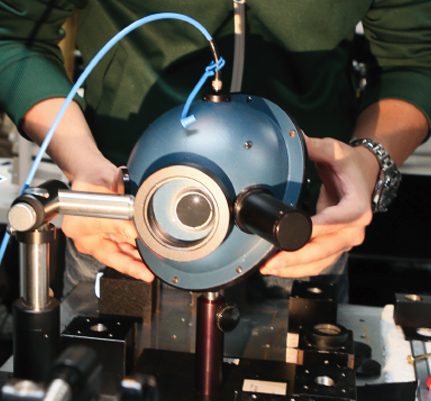
I want to make things that are useful to people! I want to learn how to design and build robots!
We provide education and research on everything from the fundamentals to applications of mechanical engineering and robotics, including vehicles such as automobiles and trains, construction machinery such as power shovels, the engines that power them and the materials that create their shapes, the robots and industrial machinery that make things in factories, and the IoT that helps our lives and society.
About the Education Program
Acquire general knowledge and fundamentals, then deepen your knowledge into a specialized curriculum
From the first to the first half of the second year, students take general education subjects, faculty and department common subjects (natural sciences) and some information subjects to acquire communication skills and social literacy, as well as basic specialized subjects in related fields (electrical circuits, electromagnetism, measurement engineering, etc.) to develop a broad perspective. From the second half of the second year onwards, students in this course systematically study a specialized curriculum on mechanical engineering and robotics, focusing on dynamics, systems, engineering design and experiments.
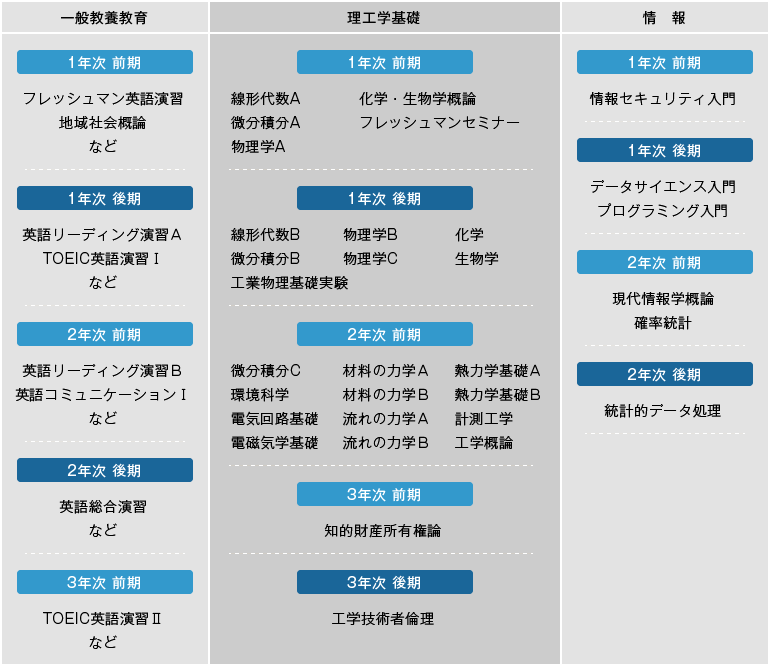
Mechanical Robot Course
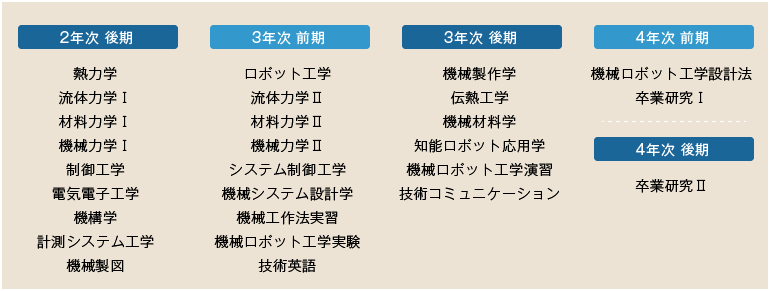
Flow of the four years
First year
Students will develop the fundamentals of science and engineering by studying general education subjects such as "human and society-related subjects," "foreign language subjects," and "regional collaboration subjects," common natural science subjects such as "mathematics," "physics," "chemistry," and "biology," and information-related subjects such as "Introduction to information security," "Introduction to data science," and "Introduction to programming."
Second Year
In the first semester, students will study a range of subjects across fields, including "Fundamentals of Electromagnetism," "Fundamentals of Electrical Circuits," "Mechanics of Materials," "Mechanics of Flow," "Fundamentals of Thermodynamics," and "Measurement Engineering," to improve their basic engineering skills. In addition, students will acquire data utilization skills through information subjects such as "Introduction to Modern Informatics," "Probability and Statistics," and "Statistical Data Processing." In the second semester, students will study specialized course subjects that form the foundations of mechanical engineering, such as "Mechanical Mechanics," "Mechanisms," and "Control Engineering."
Third Year
From the second semester of the second year, students will continue to study course-specific subjects. Students will study required subjects such as "Robotics", "Mechanical Drawing", and "Machine Work Practice", as well as elective subjects such as "Mechanical Systems Design" and "Mechanical Materials", acquiring specialized knowledge that is the core of mechanical engineering and robotics, and acquiring applied skills through practical training and exercises.
Fourth Year
The main part of learning in the fourth year is practical learning through graduation research. By applying the knowledge acquired up to that point to achieve the tasks set in each field, students will develop problem-solving skills as well as an essential understanding of the knowledge.
Mechanical Robot Course Pickup
About the classes
Mechanical Robotics Design Methodology
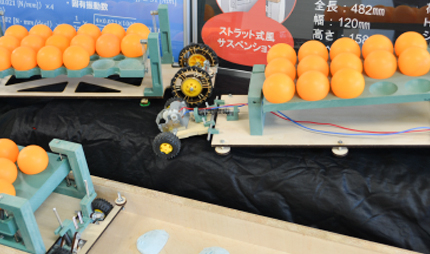
In the mechanical robotics design course, students will develop creativity and overall ability through project-based learning, and communication skills through group work. Through the application of mechanical calculations, suspension and drive system design, and parts production using CAD/CAM, students will learn the product design and manufacturing process of a vehicle that can run on rough roads without dropping its cargo, with engineering design in mind. In the final class, they will check the results in a competition.
About the Research
Research and development of robotics technology to make up for the labor shortage in society
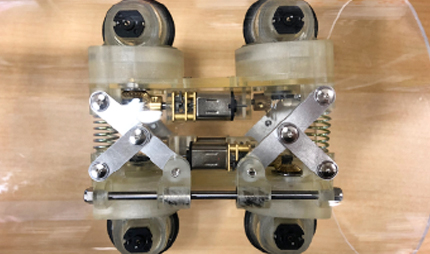
Japan is a society with a declining population, and there is a shortage of workers to support the world. The use of robots and artificial intelligence is being considered as a way to compensate for this. Therefore, we are conducting research with the aim of developing robot technology that is useful for automation and labor saving. For example, infrastructure inspection robots, bridges and tunnels, equipment in buildings, the inside of tanks, etc. require regular inspection to use them safely for a long time. To do this, we are developing component technologies and integrated technologies for inspection robots. As an example, the figure shows an in-pipe mobile robot. It moves inside a thin pipe on four wheels and checks for abnormalities. In addition, we are also researching navigation technology for autonomous mobile robots that support outdoor environmental surveys, and robot hands that can manipulate soft sheets.

Professor Masato Mizukami
Research Field
Robotics, system integration, precision mechanism design
Main research themes
Infrastructure inspection robots, micro-mechatronics
Licenses and qualifications available
driver licence
- High school teacher license (industrial) *Teacher training course credits required
Qualifications
- Assistant Engineer, etc.
Employment situation
- IHI
- JFE Steel
- Hokkaido Railway Company
- SUBARU
- Isuzu Motors
- Kajima Construction
- Kubota
- Kobelco Construction Machinery
- Suzuki
- Seiko Epson
- All Nippon Airways
- Toppan Printing
- Nipro
- Japan Steel Works
- Nippon Paper Industries
- Panasonic
- Hitachi Zosen
- FANUC
- Hokkaido Electric Power
- Honda Motor Co., Ltd.
- Makino Milling Machine
- Mazda
- MinebeaMitsumi
- Yamaha Motor Co., Ltd.
- Yotsuba Milk Industry
- Sapporo City Hall
- Hokkaido Prefectural Government
- Chiba Institute of Technology Graduate School
- Hokkaido University Graduate School
- Muroran Institute of Technology Graduate School, etc.

